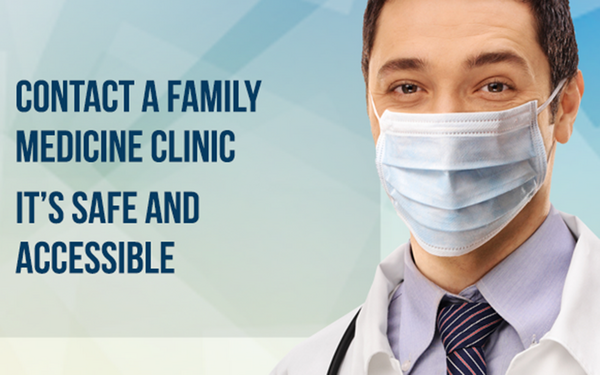
For any medical consultation, you should first contact your family doctor or your family medicine group.
If you do not have a family doctor and need a medical consultation, you can request an appointment at a clinic near you by using the ![]() RVSQ website.
RVSQ website.
If you have any COVID-19 symptoms, please call 514-644-4545 (7 days a week, from 8:00 a.m. to 8:00 p.m.) or Info-Santé, at 811 (7 days a week, 24/7).
FMGs on the territory
The territory of the CIUSSS has many Family Medicine Groups (FMGs), offering 68 hours of medical services to patients registered with its physicians, in addition to the services of various health professionals. To learn more about each of these family medicine groups:
What is a FMG?

FMGs are groups of family physicians who work closely in collaboration with other health care professionals. While each physician is responsible for the care of patients registered with him, FMG physicians have access to medical records of every patient. Consequently, a client who presents himself for a consultation may be seen by a physician other than his own. If required, this person may also meet with a nurse or other health care professional from the FMG for different types follow-ups.
The physicians in FMG are committed to offering a minimum of 68 hours of medical services as a team per week for all registered patients.
FMGs therefore offer and support:
- better monitoring of the health status and medical records of patients
- improve the quality of medical care
- improve access to medical care
Super clinics (GMF Réseau)
A FMG with a network designation is also responsible for providing simple urgent services, semi-urgent first-line services, diagnostic tests and radiological services. In addition to the services offered to patients enrolled with a FMG physician, super-clinics must:
- be open 7 days a week and 12 hours a day
- offer walk-in medical services to the entire population
- enable patients to obtain a same day appointment, up to three hours before closing
- provide access to a medical tests center
- provide access to a medical imaging laboratory
- facilitate access to specialized services
Services available in super-clinics allow people who have a non-priority condition to avoid visiting the hospital’s emergency room and experience a long wait. These are readily available services.
University FMG (GMF-U)
Some FMGs have a university designation. In addition to delivering exemplary and innovative medical services to clients, GMF-U are training venues for medical residents.
Professionals in FMGs
FMGs include family physicians working in collaboration with various professionals. This teamwork contributes to the quality and accessibility of care and services. In response to the mandate of the FMGs, each of the professionals offers different services according to the needs of their clients.
Clinician or Technician Nurse
The Clinician Nurse assesses the health status to determine and ensure the implementation of the nursing care treatment plan so as to maintain and restore health or prevent the disease. Additionally, it will design and implement care programs for complex or chronic health problems. The Clinical Nurse works with family physicians and other professionals to ensure joint client follow-up. It provides liaison with the network and resources.
Licensed Practical Nurse
The Licensed Practical Nurse contributes to the person's health status assessment, the implementation of the care plan, the provision of nursing and medical care and treatments to maintain health, restore it and prevent disease. The Licensed Practical Nurse contributes to the assessment by collecting the data, observing the patient's clinical manifestations, and linking observations to the individual's condition in collaboration with the nurse and other FMG professionals at which it communicates the information.
Specialized Nurse Practicionner - First line
The Specialized Nurse Practitioner works independently in partnership with one or more physicians to ensure the care and follow-up of patients of all ages. In addition to her experience as a clinical nurse, this Specialized Nurse is licensed to conduct anamnesis and complete physical examination of her patients in addition to developing diagnostic assumptions, prescribing diagnostic non-pharmacological and pharmacological treatments while respecting the limits of its scope of professional practice.
Social Worker
The Social Worker assesses the situation of vulnerable patients of all ages and establishes the means to act on the psychosocial factors that can harm the person's treatment or social functioning. Through his knowledge of the laws, policies, resources, he is a resource person for clients. The social worker acts as a consultant on psychosocial concerns to the members of the interdisciplinary team.
Nutritionist
The Nutritionist assesses the nutritional status of patients by looking at their eating and lifestyle habits. The Nutritionist determines the nutritional treatment plan taking into account the clinical characteristics. In addition, he is responsible for the teaching and follow-up. The Nutritionist acts as a consultant on nutritional issues to members of the interdisciplinary team.
Kinesiologist
The Kinesiologist uses the movement for prevention, treatment and performance. Its preferred means of action is physical activity according to a personalized approach. The purpose of his (or her) intervention is to encourage the clients’ self-determination so that they can adopt a physically active lifestyle on a regular basis. The Kinesiologist acts as a consultant to members of the interdisciplinary team on all issues related to physical activity and healthy lifestyles.

